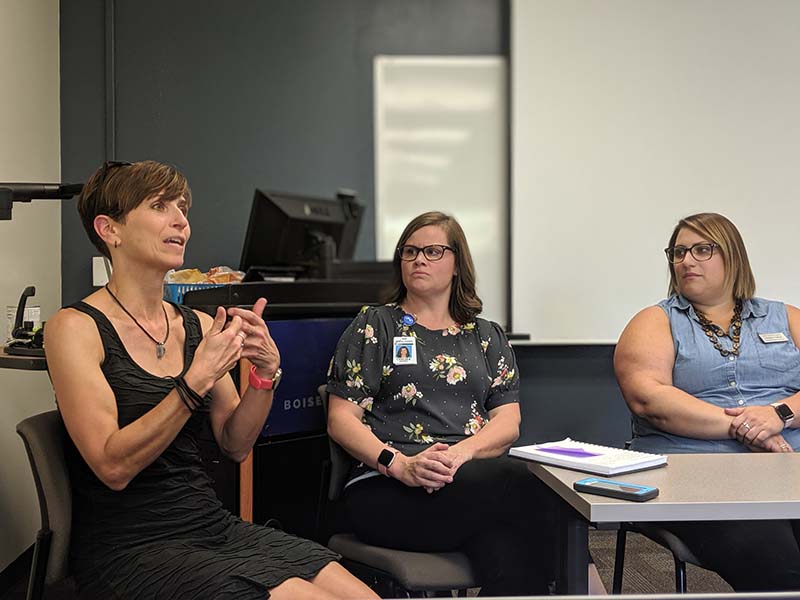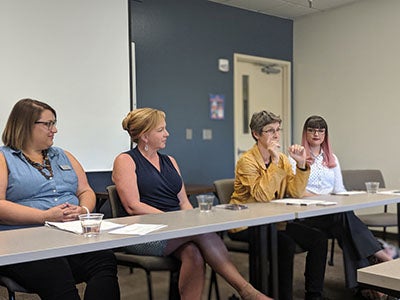
Whether earning a bachelor’s or graduate degree, students often wonder what they will encounter in the “real world” post-graduation and how to make progress on their career goals. To this end, the Master of Health Science program at Boise State University recently held an alumni panel, providing an opportunity for students to connect with successful graduates representing a spectrum of careers in local and state government, hospital systems, nonprofits and corporations.
Six alumni attended the panel session, sharing their professional journeys and recommendations for current students. They discussed their career strategies, insights on the most in-demand skills in their fields, and recommendations for seeking employment.

Common themes among the panelists included the advantages of networking, the importance of clear communication, and the value of experiential learning and internships. Though the panelists all work in public health, most of their advice is applicable to any field.
On the importance of clear communication:
“Communication is your most valuable asset. Both the way that you communicate verbally and in written form is especially is vital,” said Corey Surber, Director of State Advocacy at Saint Alphonsus Health System.
“Communication is paramount,” said Alexandra Fernández, Bureau Chief of the Division of Medicaid at the Idaho Department of Health and Welfare. Whether it’s with a superior, someone at a corporate level, a legislator, a governor or federal partners, being able to articulate yourself is critically important.”
On personal branding:
“Learn to market yourself. Learn to sell your experience, and learn to sell your brand,” said Chelsea Brown, Manager of Global Wellbeing at Micron. “Being able to look at your experience and communicate how it can apply to future professional opportunities is vital.”
“How you decide to brand yourself is how you will be received,” says Surber. She recommends “dressing like you are going to an interview” even if you are just meeting someone for a relatively informal networking coffee.
On internships and ‘leaning in’:
“Take advantage of every opportunity to engage in a real-life project – something that has an actual impact on the community,” said Fernández. “When you go to apply for a job that experience speaks volumes.”
Brown said her role at Miron started out as an internship, but she was able to demonstrate her value and the importance of the role so they hired her. “Take anything that you can get in the way of internships and volunteer hours,” she said. “You never know what it may lead to.”
“If you aren’t totally sure you can do everything listed in a job description, lean in. Don’t sell yourself short,” said Surber. We’re all learners, and you can take on big things. The only way that you’re going to grow is by trying something, sometimes failing, and then getting back up and dusting yourself off.”
On professional development and lifelong learning:
“Don’t be afraid to ask for professional development,” said Natalie Nathan, Special Projects Manager at Area 3 Senior Services Agency. Nathan recommends attending conferences where she has found a wealth of tools for best practices. “If you want your employer to send you to a conference – just ask!”
“Hone your skills in everything you’re learning in the Master of Health Science program because I’m using all of it,” says Michelle Arnett, Community Health Program Coordinator at St. Luke’s Health System. “Keep your textbooks – I have my books, and I use them like crazy.”
“You should never stop growing,” said Rhiannon Avery, Grants/Programs Manager at the City of Boise. “Don’t sell yourself short, because you have so much to offer. But find opportunities to continue learning.”
On networking:
“Attend conferences. Create a network of peers across the country and throughout the state. That is critical,” said Dieuwke Spencer, Deputy Administrator at the Idaho Department of Health and Welfare.
“Take advantage of every free opportunity that is out there including “phone a friend,” said Fernández. She says knowing partners in other states that operate similar programs will help you find resources and solve problems. “Those relationships are invaluable.”
Given the value the panelists placed on networking, they all agreed to share their contact information with students. Students interested in contacting any of the panelists can email the
Master of Health Science program at mhsinfo@boisestate.edu.
All panelists graduated from Boise State’s Master of Health Science program, which prepares students for careers that make a substantive contribution to the health of individuals, communities, and the environment. Visit the Department of Public Health and Population Science website to learn more.